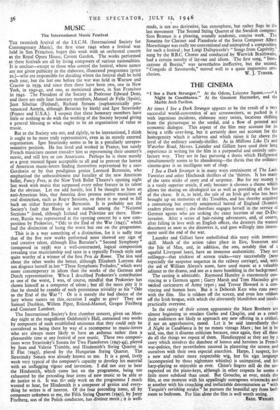MUSIC .
The International Music Festival
THE twentieth festival of the I.S.C.M. (International Society for Contemporary Music), the first since 1942 when a festival was held in San Francisco, began this week with an orchestral concert at the Royal Opera House, Covent Garden. The works performed at these festivals are all by living composers of various nationalities. It is unclear—except to those who control the festival, whose names are not given- publicity in the elaborate, illustrated programme (price 2s.)—who are responsible for deciding where the festival shall be held each year, but the last one before the war was held-in Warsaw and Cracow i'1 1939, and since then there have been two, one in New York, in 194o-41, and one, as mentioned above, in San Francisco in 1942- The President of the Society is Professor Edward Dent, and there are only four honorary members, Manuel de Falla (Spain), Jean Sibelius (Finland), Richard Strauss (euphemistically pro- vananced Austria, although Bavarian by birth) and Igor Stravinsky (France and U.S.A.). I suspect that these honorary members have little or nothing to do with the working of the Society beyond giving a general blessing to what ought to be an organisation of value to music.
But as, the Society sets out, and rightly, to be international, I think it ought to be more truly representative, even in its merely external organisation. Igor Stravinsky seems to be in a -peculiarly unrepre- aentative position. He has lived and worked in France, but surely French musicians cannot consider him as representing their country's music, and still less so can Americans. Perhaps he is there merely as a great musical figure acceptable to all and to prevent the horror of American music-lovers finding themselves represented by a neo- Gershwin or by that prodigious genius Leonard Bernstein, who emphasised the unbearableness and banality of the new American ballet, Fancy Free, at the New York Ballet Theatre's opening night last week with music that surpassed every other feature in its talent for the obvious. Let me add hastily, lest I be thought to have an anti-American bias, that America does possess native musicians of real distinction, such as Roger Sessions, so there is no need to fall back on either Stravinsky or Bernstein. It is probably not the Society's fault that Russia is not named among the " National Sections " listed, although Iceland and Palestine are there. How- ever, Russia was represented at the opening concert by a new com7 position by Prokoviev, " Ode to the End of the War (1945)," which had the distinction of being the worst but one on the programme.
This is in a way something of a distinction, for it is sadly true that of the five new works performed none showed any sign of real creative talent, although Elsa Barraine's " Second Symphony" (composed in 1938) was a well-constructed, logical composition revealing true musicianship and taste in a typically French style and quite worthy of a winner of the first Prix de Rome. The less said about the other works the better, although Elizabeth Lutyens did not disgrace herself in her " Three Symphonic Preludes," which were more contemporary in idiom than the works of the German and Dutch representatives. When I descfibed Prokoviev's contribution as one of the worst, I was, of course, mindful that Prokoviev has shown himself as a composer of talent ; but all the more pity it is that he should be capable of such pretentious triviality as his " Ode to the End of the War"! Or is it merely the bad choice of the jury whose names on this, occasion I ought to give? They are Samuel Dushkin, Willem Piper, Roland-Manuel, Gregor Fitelberg and Constant Lambert.
The International Society's first chamber concert, given on Mon- day night at the magnificent Goldsmith's Hall, contained two works by composers of such established eminence that they could only be considered as being there by way of a recompense to music-lovers who are always more likely to have an arduous rather than a pleasurable time at any festival of new music. These two composi- tions were Stravinsky's Sonata for Two Pianofortes (1943-44), played by Joan and Valerie Trimble, and Hindemith's String Quartet in E Flat (1943), played by die Hungarian String Quartet. The , Stravinsky Sonata was already,known to me. It is a good, lively work very typical of the composer's capacity to develop his material with an unflagging vigour and invention. I did not stay to hear the Hindemith, which came last on the programme, being too exhausted by the preceding four items of new music to be able to do justice to it. It was the only work on the programme I much wanted to hear, for Hindemith is a composer of genius and every- thing he writes is of interest. Of the four preceding items, all by composers unknown to me, the Fifth String Quartet 0945); by Jerzy Fitelberg, son of the Polish conductor, has distinct merit ; it is well- made, is not too derivative, has atmosphere, but rather flags in the last movement The Second String Quartet, of the Swedish composer Sten Broman is a pleasing, soundly academic, concise work. The Sonatina for Clarinet and Pianoforte of the Swiss Composer Albert Moeschinger was really too conventional and uninspired a composition for such a festival ; but Luigi Dallapiccola's " Songs from Captivity," sung by the B.B.C. Chorus and conducted by Warwick Braithwaite, had a certain novelty of lay-out and idiom. The first song, " Invo- carione di Boezio," was nevertheless ineffective, but the second, " Congedo di Savonarola," moved well to a quite impressive con-






























 Previous page
Previous page